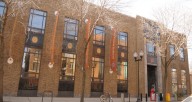UPDATE: The new seechicagodance.com will launch March 31st. Click here to learn more.
Movement Matters: Body Politic
Body Politic is a Movement Matters seasonal symposium organized to discuss the role of the radical imagination in the construction of both social movements and movement-based works of dance and performance art.
SYMPOSIUM PARTICIPANTS
Bill Ayers, Distinguished Professor at the University of Illinois at Chicago and Senior University Scholar (retired) and co-founder of anti-war, anti-racism group, the Weather Underground
Paige Cunningham, Associate Chair, Fine and Performing Arts, Columbia College Chicago
Yolanda Cesta Cursach, Associate Director of Performance Programs, Museum of Contemporary Art Chicago
Carrie Hanson, dancer and Founder of The Seldoms
Onye Ozuzu, Dean of Fine and Performing Arts, Columbia College Chicago
Naomi Miller, Operations and Administrative Manager of Place Lab, Arts and Public Life at the University of Chicago
Anna Martine Whitehead, interdisciplinary artist, writer, choreographer, and curator
Organized and moderated by Michael Workman, Founder and Director of Bridge, a (501) (c) (3) organization, reporter and columnist at Guardian US, Newcity & Sixty Inches From Center
ABOUT THE SYMPOSIUM
Body Politic is a symposium organized to discuss the role of the radical imagination in the construction of both social movements and movement-based works of dance and performance art. Much of current national and international crises surrounding social engagement practices have to do precisely with the suffering of individuals with bodies targeted for oppression, erasure and violence merely on account of superficial “difference.” In addition to those afflicted by impoverishment, black, brown, LGBTQ, aged and (both physically and psychologically) differently-abled bodies are targeted by a variety of systems driven by thoughtless, reactionary hate-ideologies. These include a wide array of socio-cultural strains, including racism of all stripes, neo-colonialism, homo- and transphobia, white supremacy, patriarchy and sexism, classism, ageism and on and on, perpetuated not just by individuals, but by organizations and institutions across a broad spectrum of society. Taking the variegated meaning of the notion of “movement” as a matter of linguisitic convention, we intend to stage a ranging interrogation of these subjects.
As the foundation out of which socio-political revolutions are built, social and cultural movements are the necessary foundations for organizing coalitions around issue-related interests across demographics and cultures. Body Politic takes the dance and performance art worlds as a microcosm study of the larger movement-building processes, and as a historical proving ground influential on the scale of international cultural relations. At the same time, operating outside the corrupting influence of structural classism inherent to other art forms, including the current outsized neoliberal subversion, for instance, of contemporary visual art industries, movement studies retains the infrastructural integrity and capability to operate on a level closer to that of literature and poetics. This proximity to historically recognized social practice fields continue today, following its integration with performance art throughout the 1960's-90's avant-garde period, when practitioners were specifically targeted by the policies of disenfranchisement and active attempts to silence dissent in the arts--and specifically works by performance artists--by moving federal definitions of obscenity in an arch-conservative, rightward direction. All of which, of course, began with Reagan's Special Presidential Task Force on the Arts and Humanities, which set the groundwork for these conservatively ideological obscenity laws, and led, for instance, to the NEA's decision to cut off federal funding for individual artists and prohibited works in the agency's grant agreements that included depictions of, for example, “homoeroticism.”
Specifically organized to provide a much-needed forum for discourse on the past and present of this specific, under-represented intersection of art and political concerns, Body Politic will investigate and expurgate the socio-political history of current artistic engagement practices at the intersection of dance and performance art.
ABOUT MOVEMENT MATTERS
A biweekly column at Sixty, seasonal symposia series and periodic performance initiative, Movement Matters investigates work at the intersection of dance, performance, politics, policy and issues related to the body.
Co-sponsored by the Old Town School of Folk Music, and supported in part by a grant from the Illinois Humanities' Illinois Speaks program. Additional program support is provided by Sixty Inches From Center, the Chicago Dancemakers Forum, Links Hall and Audience Architects.
A program of Movement Matters, The Neo-Judson Project: Dance, Performance, Art, Politics & Philosophy and Bridge, a 501(c)(3) organization.

